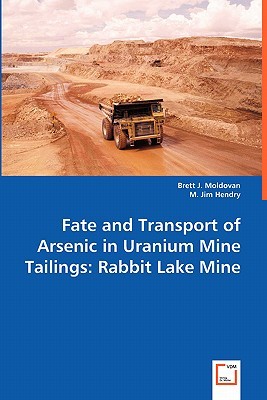
- We will send in 10–14 business days.
- Author: Brett Moldovan
- Publisher: VDM Verlag
- ISBN-10: 3639005244
- ISBN-13: 9783639005240
- Format: 15.2 x 22.9 x 1.2 cm, minkšti viršeliai
- Language: English
- SAVE -10% with code: EXTRA
Fate and Transport of Arsenic in Uranium Mine Tailings (e-book) (used book) | bookbook.eu
Reviews
Description
Mineralogical controls on the long-term stability of arsenic were studied in arsenic-rich uranium mine tailings deposited in the Rabbit Lake in-pit tailings management facility, northern Saskatchewan, Canada. Three-dimensional, reactive multi-component transport modeling of the RLITMF and the surrounding groundwater regime was conducted using geochemical field-based data, synchrotron X-ray absorption studies and laboratory-based diffusion cell experiments to quantify the fate and long-term (10,000 year) transport of arsenic. Results showed that adsorption of arsenic to the tailings and diffusive transport of dissolved arsenic in the tailings should reduce the source term concentration of arsenic to between 39 and 70% of the initial concentrations over the 10,000 year simulation period. Based on these simulations, the arsenic concentrations in the regional groundwater should be maintained at background concentrations of 0.001 mg/l over the 10,000 year period. These findings indicated that the engineered in-pit disposal of U mine tailings should provide long-term protection for the local groundwater regime from arsenic contamination.
EXTRA 10 % discount with code: EXTRA
The promotion ends in 23d.19:55:12
The discount code is valid when purchasing from 10 €. Discounts do not stack.
- Author: Brett Moldovan
- Publisher: VDM Verlag
- ISBN-10: 3639005244
- ISBN-13: 9783639005240
- Format: 15.2 x 22.9 x 1.2 cm, minkšti viršeliai
- Language: English English
Mineralogical controls on the long-term stability of arsenic were studied in arsenic-rich uranium mine tailings deposited in the Rabbit Lake in-pit tailings management facility, northern Saskatchewan, Canada. Three-dimensional, reactive multi-component transport modeling of the RLITMF and the surrounding groundwater regime was conducted using geochemical field-based data, synchrotron X-ray absorption studies and laboratory-based diffusion cell experiments to quantify the fate and long-term (10,000 year) transport of arsenic. Results showed that adsorption of arsenic to the tailings and diffusive transport of dissolved arsenic in the tailings should reduce the source term concentration of arsenic to between 39 and 70% of the initial concentrations over the 10,000 year simulation period. Based on these simulations, the arsenic concentrations in the regional groundwater should be maintained at background concentrations of 0.001 mg/l over the 10,000 year period. These findings indicated that the engineered in-pit disposal of U mine tailings should provide long-term protection for the local groundwater regime from arsenic contamination.


Reviews